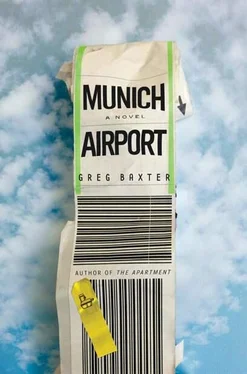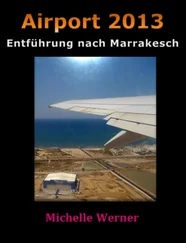About three weeks ago, my sister, Miriam, was found dead in her modest, cheerless apartment in Berlin, and my father and I went there to make arrangements. It had been four or five years since I last saw her. My father flew from home, and I flew from London, where I’ve lived for twenty-five years. And for three weeks we’ve been in Germany — mostly in Germany — waiting for her body to be released. We couldn’t decide what we’d do with her body — bury it here or fly it home and bury it there. A cremation would have been cheapest and simplest, and probably what Miriam would have wanted, but my father, after a lot of contemplation, couldn’t do it. So we flipped a coin — heads, burial in Germany, tails, burial at home. The difference was twenty thousand dollars, for starters. We were sitting on a park bench, and my father said, after a deep breath, Forgive us, Miriam, and I flipped a coin. Now her body is somewhere in a cargo hangar, having been signed off by a German undertaker, and is waiting for departure on our flight.
I come back to our table to find my father once again thanking Trish for being here, for waiting with us. She works at the US embassy in Berlin, but her husband recently moved to Munich, and she spends most weekends with him. Her flight back to Berlin isn’t until later in the evening.
Everything okay? asks my father. Everything’s okay, I say. You were gone for a while, he says. Trish gives our untouched plates commiserative glances. She ordered omelettes for us when she arrived. We needed food, she said. My father and I agreed, but then we didn’t eat. My father cut his omelette in half and the cheese and ingredients spilled out, and, as inconspicuously as possible, without trying to appear ungrateful, he pushed himself half an inch back from the table. I said mine was too hot, I’d let it cool off, and I never touched it.
The first week in Germany was a surreal and solemn week, an ordinary week, emotionally, under the circumstances. We kept ourselves busy, we saw many things, but we were, essentially, waiting. We were waiting with the expectation that something might happen at any moment. We assumed the coroner would release Miriam’s body quickly. I have no idea why we assumed this. We didn’t know that, in Germany, people are not buried in a hurry. We also didn’t understand how dispassionate German bureaucracy could be. Trish telephoned the coroner’s office every day to check on the status of Miriam’s case, and every day, during that first week, she was given no information. There was no point complaining. We had the freedom to feel wronged, but that freedom was meaningless. Finally, at the end of that first week, Trish spoke with the coroner. It would be another week at least. So we took a vacation. My father rented a car and we treated ourselves to a road trip. My father was born in Germany, but at the age of nine he emigrated to the US with his mother. We drove around some places he wanted to see, since it was likely he would never get here again. During our road trip, we ate too much, drank too much, and stayed in expensive hotels and B&Bs. I guess we were temporarily deranged. The night after we came back to Berlin, back from our travels in the rental car, we went out and had some drinks, and on the way home we actually sang Happy Birthday to a man who said it was his birthday. He was sitting on the curb and looked a bit lost, so we started up a conversation. And before we left him, we sang Happy Birthday to him. The next morning, a third and final phase of our stay in Berlin began, a phase in which my father and I, until Miriam’s body was released, spent very little time together.
This is the airport from which my father decided he wanted to fly — he didn’t want Miriam’s body on a plane out of any other airport. He said he knew it sounded strange but he wanted her on one flight out of Europe, not two connecting flights, and he wanted her flying out of an airport that was — he searched awhile for the word — classy. There are two Berlin airports, both grim and claustrophobic, and neither operates direct flights to Atlanta, which is the airport my father wanted us to land at. I arrived, three weeks ago, at Schönefeld Airport — that was the day I identified Miriam’s body. My father, the next morning, first thing, arrived at Tegel, on a one-way ticket — I went to pick him up in a taxi. They are not airports to be stuck in, and I am sure I couldn’t bear an eight-hour wait in either one.
We’ve been in the food hall since Trish arrived. Time has oozed by, it is seeping. The mezzanine level is very large, but narrow relative to the great pentagonal breadth of the level below. The food hall stretches almost all the way around, in a sort of horseshoe, and we are sitting close enough to the edge to see much of the level below. In the center of everything — a typical if slightly larger-than-normal airport bazaar — there’s a race car, an actual Formula One race car, which, I presume, you can win in a raffle. Spreading outward from the center are hundreds and hundreds of seats, seats in irregular rows, all of them swamped by bags and bodies, and the spaces between the seats are swamped with bags and bodies. And from there, in two directions, the terminal stretches outward toward a circulatory system of long corridors to the gates.
Trish is, I would say, in her mid to late twenties. Or possibly she is just a very young-looking thirtysomething. She served in Afghanistan, with the army. She did ROTC at Vanderbilt before that. She’s black and has a mild and appealing Southern accent. She is wearing brown pants, a white blouse, and a dark-brown suit jacket. She is heavy, but her clothes make her look athletic. A wool coat hangs on the back of her chair. In our time here, I have seen her wear it on a number of occasions, and it makes her extremely handsome. Would you like, she asks my father, anything else, some coffee, a cup of tea? My father contemplates the question by moving his plate around in small circles, and then he says, I haven’t slept, not a wink, maybe there’s a lounge somewhere I could lie down in, is that possible?
Trish says, You’d like to sleep?
Just rest my eyes, he says.
My father is in his mid-seventies. He retired about seven years ago. He taught European history in California, but he was always taking leave to teach, for short stints, at universities closer to home — by which I mean the South. He edited an academic journal — which was small but respected — for three decades. He published a lot of articles, and he wrote two books. The first was a highly specialized study of law codes in the time of Charlemagne. It was published by an academic press and went straight to libraries as a reference document. His second book was a generalist history of the Middle Ages. It had been written for bookstores, not libraries. He had a New York publisher, and he received a healthy advance. But it took him forever to write. He started it six or seven years before my mother’s death, and when she died he set it aside for a while. He finally returned to it and delivered it to his publishers, who had grown totally disenchanted with him, and who took a long time to get it to print. They also didn’t put a whole lot of publicity behind it, because in the intervening period between my father’s advance and the delivery of the book, another history of the Middle Ages had appeared, one with the title my father was originally going to use— The Middle Ages . Before my mother’s death, I think the failure of that book would have been devastating for him. When she was alive, I’m sure, success was something he would have welcomed — it might have allowed him to cut back on teaching and editing and spend more time at home, where he hunted, fished, bird-watched, attended small-town college football games, and used his study to smoke pipes and read and think. But after she died, his attitude changed, and he took the book’s failure with a cheerful fatalism. And he never started anything ambitious, at least on that scale, again — or if he did, he did so secretly, and it never came to anything, not even a mention, in all the conversations we have had since his book came out, and all the times we have seen each other, as a joke or an aside, or an earnest admission of a small disappointment. When I call him from London, these days, and he’s at home, he’s watching golf. He watches golf from all over the world, at all hours of the day — golf in Japan, in South Africa, in Sweden. I don’t know if days and nights mean much to him now. The only regularity imposed upon his life is the upkeep of the house. He has a man come by once a week to clean the swimming pool. Another man comes once a week — or twice in spring and summer — to look after the garden. And a woman comes once a week to clean the house. There isn’t much for her to do, because he disturbs only a fraction of it. He tells me, when we talk on the phone, about the wonder and frustrations of getting things done with the Yellow Pages. He can’t look at a computer screen for more than half an hour without fainting, he says. So the Yellow Pages are his Internet. He says things like, I found some guys who can build me a deck really cheap, or, I’m probably going to get solar panels on the roof. But he has not yet built the deck or got solar panels.
Читать дальше











